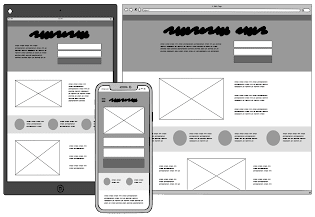The Rise of Augmented Reality: How AR is Revolutionizing Mobile App
Experiences
In recent years, the technology landscape has witnessed a remarkable evolution with the advent of
augmented reality (AR). This cutting-edge technology has not only captured the imagination o
f users but has also transformed the way we interact with mobile applications. Augmented reality,
often abbreviated as AR, blends digital elements with the real world, creating immersive experiences
that were once confined to the realms of science fiction. Let's explore how AR is revolutionizing
mobile app experiences and shaping the future of digital interaction.
From retail to gaming and beyond, augmented reality (AR) has found its way into various sectors,
unlocking new possibilities and enhancing user engagement. One of the most notable areas where
AR has made a significant impact is in the realm of gaming. Games like Pokemon Go took the world
by storm, allowing players to hunt for virtual creatures in real-world locations using their smartphones.
This innovative blend of digital and physical worlds created a sensation, demonstrating the immense
potential of AR in gaming and beyond.
But AR's influence extends far beyond entertainment. In the retail sector, businesses are leveraging
augmented reality (AR) to offer immersive shopping experiences to their customers. Imagine being
able to virtually try on clothes or visualize furniture in your living room before making a purchase.
AR-powered apps enable users to do just that, providing a more engaging and personalized shopping
experience. By integrating AR technology into their mobile apps, retailers can drive customer satisfaction
and boost sales.
Moreover, augmented reality (AR) is revolutionizing education by providing interactive learning
experiences. Students can explore virtual simulations, dissect virtual organisms, or travel back in
time to historical events, all from the comfort of their classrooms. AR-enabled educational apps
make learning more engaging and accessible, catering to different learning styles and enhancing retention.
In healthcare, augmented reality (AR) is proving to be a game-changer, facilitating medical training,
surgical planning, and patient care. Surgeons can use AR to overlay digital images onto a patient's
body during surgery, providing real-time guidance and improving precision. Medical students can
also benefit from AR simulations to practice complex procedures in a risk-free environment.
As augmented reality (AR) continues to gain traction, developers are pushing the boundaries of
innovation, creating new and exciting experiences for users. Whether it's exploring virtual worlds,
solving puzzles, or interacting with digital avatars, the possibilities are endless. With the rapid
advancement of AR technology, we can expect to see even more groundbreaking applications in
the years to come.
However, the widespread adoption of augmented reality (AR) also presents challenges,
particularly concerning privacy and security. As AR apps collect and analyze user data to deliver
personalized experiences, there are concerns about data privacy and the potential misuse of personal
information. Developers must prioritize user privacy and implement robust security measures to
safeguard sensitive data.
Despite these challenges, the future of augmented reality (AR) looks promising. With its ability
to blend the virtual and physical worlds seamlessly, AR is poised to revolutionize mobile app e
xperiences across industries. Whether it's enhancing gaming experiences, transforming retail, or
revolutionizing education and healthcare, AR has the power to reshape the way we interact with technology.
In conclusion, augmented reality (AR) is not just a fleeting trend but a transformative technology
that is reshaping the digital landscape. Its ability to create immersive, interactive experiences is
revolutionizing mobile app experiences and opening up new possibilities across various sectors.
As AR continues to evolve, we can expect to see even more innovative applications that push the
boundaries of what's possible in the digital realm.
+iPhone+%7C+iPod+%7C+iPad.png)
+iPhone+%7C+iPod+%7C+iPad+0.png)
+iPhone+%7C+iPod+%7C+iPad+1.png)
+iPhone+%7C+iPod+%7C+iPad+2.png)
+iPhone+%7C+iPod+%7C+iPad+4.png)
+iPhone+%7C+iPod+%7C+iPad+3.png)
+iPhone+%7C+iPod+%7C+iPad+5.png)
+iPhone+%7C+iPod+%7C+iPad+6.png)
+iPhone+%7C+iPod+%7C+iPad+7.png)
+iPhone+%7C+iPod+%7C+iPad+8.png)
+iPhone+%7C+iPod+%7C+iPad+9.png)
+iPhone+%7C+iPod+%7C+iPad+10.png)
+iPhone+%7C+iPod+%7C+iPad+11.png)
+iPhone+%7C+iPod+%7C+iPad+12.png)
+iPhone+%7C+iPod+%7C+iPad+13.png)
+iPhone+%7C+iPod+%7C+iPad+14.png)
+iPhone+%7C+iPod+%7C+iPad+15.png)
+iPhone+%7C+iPod+%7C+iPad+16.png)
+iPhone+%7C+iPod+%7C+iPad+17.png)
























